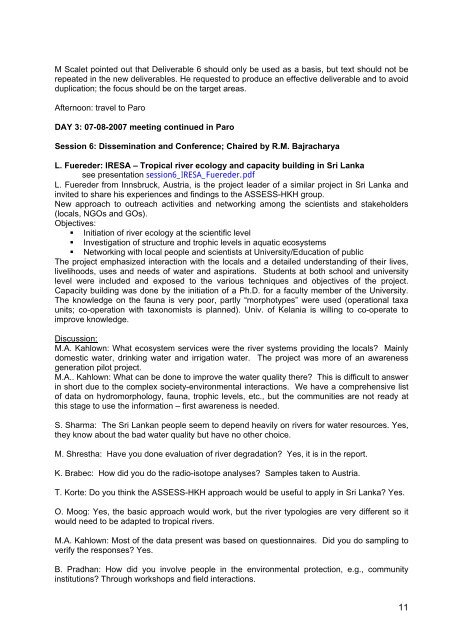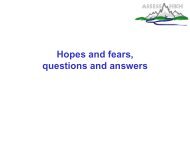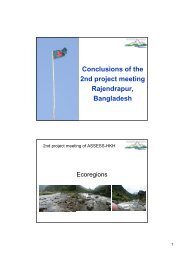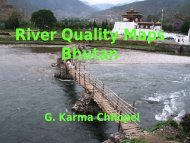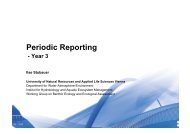2007 - ASSESS-HKH
2007 - ASSESS-HKH
2007 - ASSESS-HKH
You also want an ePaper? Increase the reach of your titles
YUMPU automatically turns print PDFs into web optimized ePapers that Google loves.
M Scalet pointed out that Deliverable 6 should only be used as a basis, but text should not be<br />
repeated in the new deliverables. He requested to produce an effective deliverable and to avoid<br />
duplication; the focus should be on the target areas.<br />
Afternoon: travel to Paro<br />
DAY 3: 07-08-<strong>2007</strong> meeting continued in Paro<br />
Session 6: Dissemination and Conference; Chaired by R.M. Bajracharya<br />
L. Fuereder: IRESA – Tropical river ecology and capacity building in Sri Lanka<br />
see presentation session6_IRESA_Fuereder.pdf<br />
L. Fuereder from Innsbruck, Austria, is the project leader of a similar project in Sri Lanka and<br />
invited to share his experiences and findings to the <strong>ASSESS</strong>-<strong>HKH</strong> group.<br />
New approach to outreach activities and networking among the scientists and stakeholders<br />
(locals, NGOs and GOs).<br />
Objectives:<br />
• Initiation of river ecology at the scientific level<br />
• Investigation of structure and trophic levels in aquatic ecosystems<br />
• Networking with local people and scientists at University/Education of public<br />
The project emphasized interaction with the locals and a detailed understanding of their lives,<br />
livelihoods, uses and needs of water and aspirations. Students at both school and university<br />
level were included and exposed to the various techniques and objectives of the project.<br />
Capacity building was done by the initiation of a Ph.D. for a faculty member of the University.<br />
The knowledge on the fauna is very poor, partly “morphotypes” were used (operational taxa<br />
units; co-operation with taxonomists is planned). Univ. of Kelania is willing to co-operate to<br />
improve knowledge.<br />
Discussion:<br />
M.A. Kahlown: What ecosystem services were the river systems providing the locals Mainly<br />
domestic water, drinking water and irrigation water. The project was more of an awareness<br />
generation pilot project.<br />
M.A.. Kahlown: What can be done to improve the water quality there This is difficult to answer<br />
in short due to the complex society-environmental interactions. We have a comprehensive list<br />
of data on hydromorphology, fauna, trophic levels, etc., but the communities are not ready at<br />
this stage to use the information – first awareness is needed.<br />
S. Sharma: The Sri Lankan people seem to depend heavily on rivers for water resources. Yes,<br />
they know about the bad water quality but have no other choice.<br />
M. Shrestha: Have you done evaluation of river degradation Yes, it is in the report.<br />
K. Brabec: How did you do the radio-isotope analyses Samples taken to Austria.<br />
T. Korte: Do you think the <strong>ASSESS</strong>-<strong>HKH</strong> approach would be useful to apply in Sri Lanka Yes.<br />
O. Moog: Yes, the basic approach would work, but the river typologies are very different so it<br />
would need to be adapted to tropical rivers.<br />
M.A. Kahlown: Most of the data present was based on questionnaires. Did you do sampling to<br />
verify the responses Yes.<br />
B. Pradhan: How did you involve people in the environmental protection, e.g., community<br />
institutions Through workshops and field interactions.<br />
11


